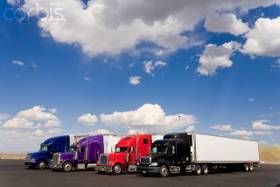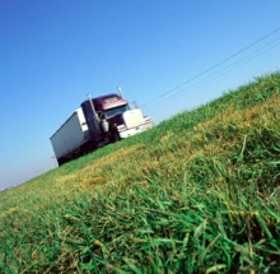Daycab Owner Operators
Topic 921 | Page 1
Hey Robert. Well I've gotta be honest - we very much discourage the idea of owning or leasing a truck here at TruckingTruth. In fact, we would consider tying someone to a telephone pole if it was the only way to keep them from buying or leasing a truck.

Turning a consistent profit in the trucking industry is so difficult that even trucking companies with thousands of trucks that have been around for more than half a century find it very difficult to do. A fella like yourself coming into the industry brand new and not knowing the first thing about it has pretty much zero chance of turning a worthwhile profit, if any profit at all.
I highly, highly recommend you put the idea of owning or leasing a truck completely out of your mind forever. But if I can't get ya to do that, at least forget about it for a minimum of one year so you can learn how to handle a rig and learn how the trucking industry works. Trying to learn a new trade in a new industry and start your own business at the same time is pretty much financial suicide and will likely lead to a nervous breakdown.
But if you'd like to learn more about becoming an owner operator , check out the Owner Operator Independent Drivers Association website (OOIDA). They're the best place to get started with your research.
Owner Operator:
An owner-operator is a driver who either owns or leases the truck they are driving. A self-employed driver.
OOIDA:
Owner-Operator Independent Drivers Association
Who They Are
OOIDA is an international trade association representing the interests of independent owner-operators and professional drivers on all issues that affect truckers. The over 150,000 members of OOIDA are men and women in all 50 states and Canada who collectively own and/or operate more than 240,000 individual heavy-duty trucks and small truck fleets.
Their Mission
The mission of OOIDA is to serve owner-operators, small fleets and professional truckers; to work for a business climate where truckers are treated equally and fairly; to promote highway safety and responsibility among all highway users; and to promote a better business climate and efficiency for all truck operators.
OWI:
Operating While Intoxicated

Robert, we are O/O's of a semi, we pull a flatbed, and run all lower 48 states. The only O/O day cabs we see, and they are very very few, are pulling local seasonal produce from farm to processor. But to help you understand a little about making it as an O/O, with a day cab , i'll help you with some basic pointers.
As an O/O, its all about money coming in. You will have truck payments, tags, permits, license, taxes, maintenance costs, and the big one FUEL. So to keep up with all these expenses you will need all the miles you can get. Running all lower 48, you should get the miles. but driving day cab, lets say within a 300 mile radius of home, you won't be getting enough miles. Now I put that radius at 300 miles, because going out, and coming back home should about burn your drive time at 600 miles total, unless you are fond of sleeping in a day cab. I've don it, I do it every grape season, I wouldn't recommend it for getting any real rest. OK, so your limited to your distance, and now you would be looking for runs to make. You would need a broad base of brokers to keep a day cab busy enough to pay for itself.....and we haven't even started talking about paying for your bills at home .Locally, most freight is shipped by well established companies. I don't personally know of any in my neck of the woods that takes on O/O's. There may be some out there, but the logistics are all wrong. You would have to pull company trailers, and it would be seldom that you would drop and hook. You would find yourself burning up your clock time delivering, and unloading freight at alot of places. Most day cab freight is LTL , and/or local delivery. So I doubt that being a O/O in a day cab could even be a reality. Basically, it comes down to the bottom line for O/O's...Times= money...and you have to make the miles to make the money. You won't do that in a day cab running local freight...Sorry.
.Locally, most freight is shipped by well established companies. I don't personally know of any in my neck of the woods that takes on O/O's. There may be some out there, but the logistics are all wrong. You would have to pull company trailers, and it would be seldom that you would drop and hook. You would find yourself burning up your clock time delivering, and unloading freight at alot of places. Most day cab freight is LTL , and/or local delivery. So I doubt that being a O/O in a day cab could even be a reality. Basically, it comes down to the bottom line for O/O's...Times= money...and you have to make the miles to make the money. You won't do that in a day cab running local freight...Sorry.
LTL:
Less Than Truckload
Refers to carriers that make a lot of smaller pickups and deliveries for multiple customers as opposed to hauling one big load of freight for one customer. This type of hauling is normally done by companies with terminals scattered throughout the country where freight is sorted before being moved on to its destination.
LTL carriers include:
- FedEx Freight
- Con-way
- YRC Freight
- UPS
- Old Dominion
- Estes
- Yellow-Roadway
- ABF Freight
- R+L Carrier
Day Cab:
A tractor which does not have a sleeper berth attached to it. Normally used for local routes where drivers go home every night.
Drop And Hook:
Drop and hook means the driver will drop one trailer and hook to another one.
In order to speed up the pickup and delivery process a driver may be instructed to drop their empty trailer and hook to one that is already loaded, or drop their loaded trailer and hook to one that is already empty. That way the driver will not have to wait for a trailer to be loaded or unloaded.

Not only do you have to find a truck and gets tags,permits and insurance then there are the fees associated with getting your own authority. So right off the bat your into major debt unless your independenly wealthy. And after all that and this part is completely separate from the start up cost involved with a truck....its recommended that you have a minimum of $10k in cash for fuel maintenance and the like to cover cost since it can be up to a month before brokers will pay their bills they owe you.
And if you go with a used truck to make things cheaper then you got the expenses of research. Having the truck dyo tested and having a EMC report pulled from the truck BEFORE you buy can be up to and over $1000.
So at the very least you will be in debt from $30k to $150k and that's even before you start hauling freight.
Do yourself a favor and start out at a company first before you even consider owning a truck.

Well, these responses have definitely broadened my horizon. What about Intermodal?
Intermodal:
Transporting freight using two or more transportation modes. An example would be freight that is moved by truck from the shipper's dock to the rail yard, then placed on a train to the next rail yard, and finally returned to a truck for delivery to the receiving customer.
In trucking when you hear someone refer to an intermodal job they're normally talking about hauling shipping containers to and from the shipyards and railyards.

I just want to chime in and say that with every person I've talked to about being an owner operator , they were so adamant that I don't do it that it almost felt as if they were begging me to avoid OO as much as humanly possible, and I have never mentioned even wanting to be an OO. So, for what it's worth, there's my :2cents.
I wish the best of luck to you and I am sure I will follow up on this thread to watch your story unfold!
Owner Operator:
An owner-operator is a driver who either owns or leases the truck they are driving. A self-employed driver.

I just want to chime in and say that with every person I've talked to about being an owner operator , they were so adamant that I don't do it that it almost felt as if they were begging me to avoid OO as much as humanly possible, and I have never mentioned even wanting to be an OO. So, for what it's worth, there's my :2cents.
I wish the best of luck to you and I am sure I will follow up on this thread to watch your story unfold!
Thanks for those encouraging words Jerry. I never really thought about being an O'O either until one day when i saw a pair of used Freightliner M915A3's at a dealership near where i work. You don't see any of those in the civilian field. I just thought they were such good looking trucks and had ideas of maybe driving one for a living. Now I just don't know.
Owner Operator:
An owner-operator is a driver who either owns or leases the truck they are driving. A self-employed driver.
HOS:
Hours Of Service
HOS refers to the logbook hours of service regulations.
Even doing intermodal , you are STILL limited to around 300 miles out, and 300 miles back....unless you want to sleep in your day cab.
Day Cab:
A tractor which does not have a sleeper berth attached to it. Normally used for local routes where drivers go home every night.
Intermodal:
Transporting freight using two or more transportation modes. An example would be freight that is moved by truck from the shipper's dock to the rail yard, then placed on a train to the next rail yard, and finally returned to a truck for delivery to the receiving customer.
In trucking when you hear someone refer to an intermodal job they're normally talking about hauling shipping containers to and from the shipyards and railyards.
New Reply:
New! Check out our help videos for a better understanding of our forum features

















Preview:








 TT On Facebook
TT On Facebook
Im currently in cdl school and have a few questions about the life of daycab owner operators.
1) Can they make a decent living even with alot of the regional and local market covered by companies like Estes,JB Hunt,Conway etc 2) Do they find their loads through freight brokers? 3) Do they have to own their own trailer? 4) Is it common for a daycab o'o to lease their truck with a company?
Im basically looking for the full A to Z about daycab owner operators.
CDL:
Commercial Driver's License (CDL)
A CDL is required to drive any of the following vehicles:
Regional:
Regional Route
Usually refers to a driver hauling freight within one particular region of the country. You might be in the "Southeast Regional Division" or "Midwest Regional". Regional route drivers often get home on the weekends which is one of the main appeals for this type of route.
Owner Operator:
An owner-operator is a driver who either owns or leases the truck they are driving. A self-employed driver.